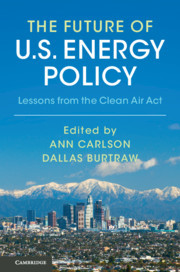Description
Lessons from the Clean Air Act
Building Durability and Adaptability into US Climate and Energy Policy
Coordinators: Carlson Ann, Burtraw Dallas
Examines the successes and failures of the Clean Air Act in order to lay a foundation for future energy policy.
Language: English
Subject for Lessons from the Clean Air Act:
Lessons from the Clean Air Act
Publication date: 05-2019
260 p. · 15.5x23.5 cm · Hardback
Publication date: 05-2019
260 p. · 15.5x23.5 cm · Hardback
Lessons from the Clean Air Act
Publication date: 05-2019
260 p. · 15.2x22.8 cm · Paperback
Publication date: 05-2019
260 p. · 15.2x22.8 cm · Paperback
Description
/li>Contents
/li>Biography
/li>
Climate and energy policy needs to be durable and flexible to be successful, but these two concepts often seem to be in opposition. One venerable institution where both ideas are apparent is the Clean Air Act, first passed by the United States Congress in 1963, with amendments in 1970 and 1990. The Act is a living institution that has been hugely successful in improving the environment. It has programs that reach across the entire economy, regulating various sectors and pollutants in different ways. This illuminating book examines these successes - and failures - with the aim to offer lessons for future climate and energy policymaking in the US at the federal and state level. It provides critical information to legislators, regulators, and scholars interested in understanding environmental policymaking.
1. Introduction Ann E. Carlson and Dallas Burtraw; 2. The Clean Air Act's national ambient air quality standards: a case study of durability and flexibility in program design and implementation William Boyd; 3. Stationary sources, movable rules: intransigence and innovation under the Clean Air Act Hannah J. Wiseman; 4. Leveraged federalism and the Clean Air Act: the case of vehicle emissions control Barry G. Rabe; 5. Promoting environmental quality through fuels regulations: lessons for a durable energy and climate policy Joseph E. Aldyi; 6. The Clean Air Act's use of market mechanisms Eric M. Patashnik; 7. Conclusion Ann E. Carlson and Dallas Burtraw.
Ann E. Carlson is the Shirley Shapiro Professor of Environmental Law at the University of California, Los Angeles School of Law. She is the faculty co-director of the Emmett Institute on Climate Change and the Environment and has written extensively on climate change, air pollution and energy law.
Dallas Burtraw is the Darius Gaskins Senior Fellow at Resources for the Future. Burtraw has worked to promote efficient control of air pollution and has written extensively on electricity industry regulation and environmental outcomes.
Dallas Burtraw is the Darius Gaskins Senior Fellow at Resources for the Future. Burtraw has worked to promote efficient control of air pollution and has written extensively on electricity industry regulation and environmental outcomes.
© 2024 LAVOISIER S.A.S.



